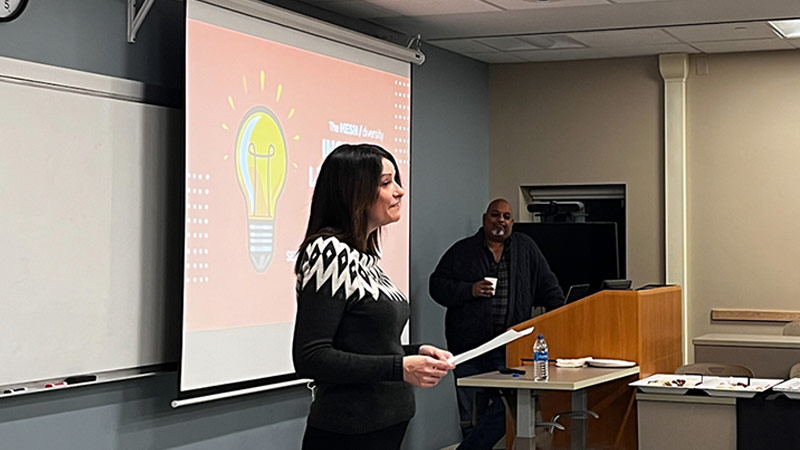Faculty of computer science seeks cultural shift with innovative EDI leadership program
Author: Hilary Creamer Robinson
Posted on Nov 30, 2023
Category: UNB Fredericton , UNB Saint John

Photo: Natalie Webber, teaching professor and EDI lead for the faculty of computer science.
The University of New Brunswick (UNB) faculty of Computer Science (CS) is piloting a leadership program in partnership with MESH/diversity, a software company co-founded by UNB graduate Mike Wright ((BBA’96, BCS’99). The company provides AI-driven equity, diversity and inclusion (EDI) training for workplaces and organizations.
Natalie Webber, teaching professor and EDI lead for the faculty of computer science, said the faculty is experiencing rapid growth, and with it, is seeking to evolve into a more welcoming, supportive and equitable learning environment.
“We’re seeing a large amount of growth in our student population right now,” she said, “both at the undergraduate and graduate levels. We’re hiring to support that growth and want to make sure we’re managing all of that with EDI in mind.”
With considerable support and financial assistance from the McKenna Institute, the faculty launched MESH/diversity’s training program on Nov. 22, where the inaugural group of 50 CS students, faculty and staff came together over dinner for the first evening session.
Webber said that a diverse group will bring more varied perspectives to the pilot, the first of its kind for the company, which will deepen participants’ learning and enhance the overall experience.
“We don’t have a balanced diversity, so getting people to stop and think and look at things from other people’s perspectives will be eye-opening.”
Webber anticipates that through this training, participants, and students in particular, will go back to their classes, labs and co-ops with a new awareness.
“Having students who will put what they’ve learned into practice will have a big impact on our faculty. It could have the power to change the entire climate,” she said.
As a UNB computer science alum, Webber is no stranger to the EDI gaps that have long plagued the STEM landscape.
“In my time, I took many classes where I was the only woman, or one of three, in the entire class,” she said. “There were times when I didn’t feel comfortable speaking up or taking up space in the room. I felt different. I felt othered.”
This representational challenge is no secret, Webber said. “We’d love to improve our gender diversity in computer science. We’d love to see more Indigenous students coming into our programs.”
Alongside Webber’s recent appointment as the faculty’s EDI lead, the MESH/diversity pilot is a significant step toward a long-overdue cultural overhaul.
“We’re offering this pilot in an effort to enhance and support the accessibility of our programs and actively engage with faculty, staff and students when it comes to equity, diversity and inclusion,” she said.
“My hope is that when we send our people out into the world, they will be catalysts for positive change. This is the first step.”
The MESH/diversity EDI training program being piloted by the Faculty of Computer Science includes seven interactive modules over a two-year period. Each interactive session covers topics like the key differences between diversity, inclusion and belonging, the power of compassion, privilege and oppression, and effective communication.
Related: Mike Wright on making meaningful progress in the areas of diversity, equity and inclusion.
